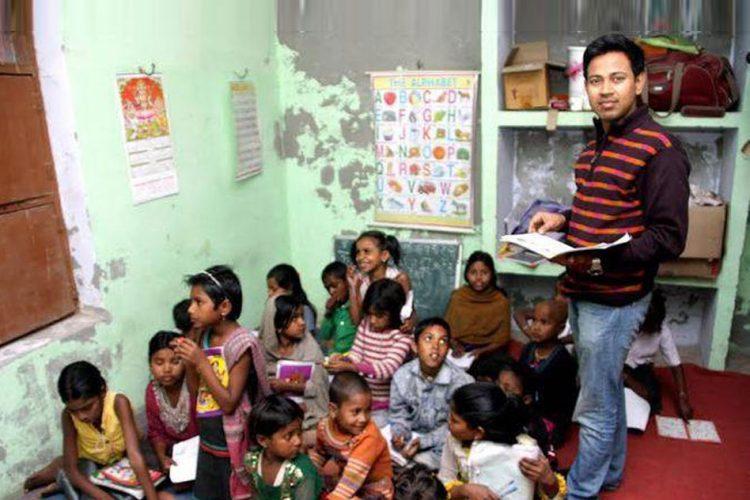Miss Alone
Prime VIP

“The task of the modern educator is not to cut down jungles, but to irrigate deserts.” said the famous English novelist C. S. Lewis.
It is easier said than done. Yet, Dr. Venkatesh Murthy, faculty at Indian Institute of Management Rohtak, is trying to bring the elusive light of education in the lives of the children of the marginalised sections of the society.
For the past more than a year, Dr. Murthy has been teaching the children of ragpickers of the Kabir Colony in Rohtak city. He has been devoting 2 hours consistently from 5.45 pm to 7.45 pm to this honorary cause for five days a week and without fail.
So what motivated Dr. Murthy to work towards ensuring education to the children of one of the most downtrodden sections of our society, while his regular students at the IIM are being groomed for becoming managers in multinational corporations?
“One night while riding a bicycle, I came across a ragpicker. We had a conversation and he told me that their children do not go to school. Next day, I visited the place and made enquiries. The plight of ragpickers residing in this locality moved me and I decided to teach their children,” he explains.
It was not that easy to start with. The parents of these children needed a lot of persuasion about how it was in the interest of their own children. Gradually, as the word of mouth spread, more children started joining his evening school. His enthusiasm and dedication got his school 60 enrolments in a very short span of time. And it is not just the numbers which is encouraging and heartening. “Children now eagerly wait for the evening to reach the classroom. It’s these moments of joy on the faces of poor children that I had been waiting to see,” he says.
“These ragpickers are forced to live a hand-to-mouth existence. In such a scenario, they are not able to pay enough attention to their child’s education or future. At times, though, they may dream of their children going to school like the local children, but they hardly do anything to make this a reality” explains Dr. Murthy to The Logical Indian.
“The society should also take a fair share of blame for this”, he adds, “They are looked at with suspicion because they do not speak the same language as the rest of the surrounding society, they do not practice the same profession as the others do, they do not conduct themselves in a socially acceptable manner in public places, and they appear to be rather dirty people. Because these ragpickers tend to create a temporary inventory of waste material in a residential area, the local population often wants to drive away these people from their vicinity.”
Recently, his initiative got a shot in the arm when as many as 11 children of migrant ragpickers, who were denied admission last year, were admitted to a government school. Dr Murthy’s enquiries revealed that the school denied them admission last year citing various grounds such as lack of documents to prove the date of birth of the child, and the ragpicker community being constantly moving. The most important reason, however, was the inability of these children to understand the medium of teaching, i.e. Hindi. All of them are Bengali speaking migrants.
Unfortunately, however, after the first couple of weeks of joining the school, the children had no interest or motivation to go to school. According to Dr. Murthy, this is because other children and teachers discriminate against or ill-treat them at school or perhaps because their parents don’t want them to go to school.
Whatever might have been the reason, the dedicated professor didn’t give up.
He personally visits four pockets of ragpicker areas every morning between 6.45 and 8.15 AM (before his office hours) since July this year to try and ensure every child gets ready to go to school. He personally groups them and drops them off to school.
The name of the initiative was changed from ‘Badhte Kadam’ to ECIS (Each Child In School) in June this year, indicating the objective that is being strived for. But he is not alone in his endeavour. Dr Mahua and Dr Suresh and more than 30 of his students from IIM Rohtak are also a part of his school. While he continues to work with children of Kabir Colony, they have expanded the concept further in three other areas of Rohtak (Film city area, Railway line, and Suneria village), and despite their academic commitments, are doing their best to maintain regularity in their visits, Dr Murthy points out.
Sensitivity is what is missing in the teachers of the government schools, he says. To address this problem, he and two other faculties of IIM Rohtak in collaboration with Sarva Shiksha Abhiyan conducted a workshop on 16 April 2015 for 80 schoolteachers from all the 22 government schools in Rohtak city. The aim was to sensitise teachers on inclusive education.
Dr. Murthy holds a doctoral degree in the area of Social Sciences from Tata Institute of Social Sciences (TISS) Mumbai, and has been teaching courses such as ‘Cultural diversity’, ‘Socio-Cultural environment of business’, ‘Social Entrepreneurship’ and Socio-Economic transformation of India.
Across the country, organisations such as Pratham, Teach for India, jeevanshala and Eklavya have been running alternative education systems for children from socially excluded sections including ragpickers. These alternatives have been more successful than the existing state-sponsored educational system, both in accommodating children from downtrodden sections and also in building a creative educational atmosphere.
However, the role of such non-state actors is very limited in terms of their reach or the scope of their activity, as their resources are limited and the problem is gigantic. It is the state which needs to do the most and these small alternatives can be looked upon as complementary resources.
